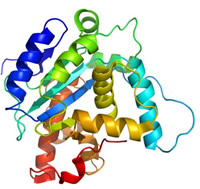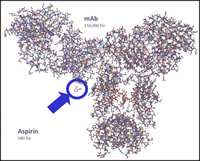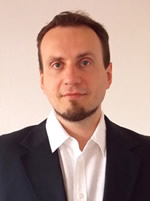
HTC-15 Short Course - INTRODUCTION TO BIOPHARMACEUTICAL ANALYSIS
Course Overview
 Presented by world renowned experts in the field of biopharmaceutical analysis, this introductory course covers all major aspects of biopharmaceutical analysis and characterisation. We review the current and future pharmaceutical marketplace as well as examining what constitutes a biopharmaceutical, how they differ from traditional small molecules and their critical quality attributes. We then thoroughly investigate the range of techniques required to fully characterise and analyse these molecules using a wide range chromatographic modes and detection techniques.
Presented by world renowned experts in the field of biopharmaceutical analysis, this introductory course covers all major aspects of biopharmaceutical analysis and characterisation. We review the current and future pharmaceutical marketplace as well as examining what constitutes a biopharmaceutical, how they differ from traditional small molecules and their critical quality attributes. We then thoroughly investigate the range of techniques required to fully characterise and analyse these molecules using a wide range chromatographic modes and detection techniques.
Who Should Attend
Those currently involved in biopharmaceutical analysis, those interested in a career analysing and characterising biopharmaceuticals and those looking to move into this field from a small molecule/traditional pharmaceutical background.
Course Outline
- Introduction to biopharmaceuticals - contrasting with small molecules/traditional pharmaceuticals
- Recent evolution of biopharmaceuticals and the biopharmaceutical market
- The production of a biopharmaceutical
- Critical performance characteristics - common co- and post-translational modifications specific to biopharmaceuticals (emphasis on mAbs)
- Overview of techniques employed in biopharmaceuticals analysis
- Detailed review and application areas of the following techniques
- Reversed Phase (covering intact, fragments, peptides and amino acids)
- HILIC (including glycan workflow's)
- Ion exchange
- Size Exclusion Chromatography
- Hydrophobic Interaction Chromatography
- Course summary/conclusions
Course Timings
 10:00 - 10:30 Coffee and Registration
10:00 - 10:30 Coffee and Registration
10:30 - 12:30 Session 1 (2hrs)
12:30 - 13:15 Lunch
13:15 - 14:30 Session 2 (1.25hrs)
14:30- 14:45 Coffee Break
14:45 - 16:00 Session 3 (1.25hrs)
 Koen Sandra received a PhD degree in Biochemistry from the Ghent University, Belgium in 2005. After his PhD, he joined Pronota, a molecular diagnostics company where he was active in developing analytical platforms for disease biomarker discovery and in setting up external collaborations. In 2008, he joined the Research Institute for Chromatography (RIC), a company that provides chromatographic and mass spectrometric support to the chemical, life sciences and pharmaceutical industries, where he currently holds the position of Scientific Director. He is furthermore co-founder and co-owner of anaRIC biologics, a company that offers a complete range of analytical solutions for characterization, quality control, release and stability testing of biological drugs and of Metablys, an institute performing metabolomics and lipidomics research. As a non-academic scientist, Koen Sandra is author of over 40 highly cited scientific papers and has presented his work at numerous conferences as an invited speaker.
Koen Sandra received a PhD degree in Biochemistry from the Ghent University, Belgium in 2005. After his PhD, he joined Pronota, a molecular diagnostics company where he was active in developing analytical platforms for disease biomarker discovery and in setting up external collaborations. In 2008, he joined the Research Institute for Chromatography (RIC), a company that provides chromatographic and mass spectrometric support to the chemical, life sciences and pharmaceutical industries, where he currently holds the position of Scientific Director. He is furthermore co-founder and co-owner of anaRIC biologics, a company that offers a complete range of analytical solutions for characterization, quality control, release and stability testing of biological drugs and of Metablys, an institute performing metabolomics and lipidomics research. As a non-academic scientist, Koen Sandra is author of over 40 highly cited scientific papers and has presented his work at numerous conferences as an invited speaker.
 Dr Szabolcs Fekete holds a PhD degree in analytical chemistry from the Technical University of Budapest, Hungary. He worked at the Chemical Works of Gedeon Richter Plc at the analytical R&D department for 10 years. Since 2011, he is working as scientific collaborator at the University of Geneva in Switzerland. He contributed ~100 journal articles, authored book chapters and edited handbooks. His main interests include liquid chromatography (RP, IEX, SEC, HIC, SFC, HILIC), column technology, method development, pharmaceutical and protein analysis and mass transfer processes.
Dr Szabolcs Fekete holds a PhD degree in analytical chemistry from the Technical University of Budapest, Hungary. He worked at the Chemical Works of Gedeon Richter Plc at the analytical R&D department for 10 years. Since 2011, he is working as scientific collaborator at the University of Geneva in Switzerland. He contributed ~100 journal articles, authored book chapters and edited handbooks. His main interests include liquid chromatography (RP, IEX, SEC, HIC, SFC, HILIC), column technology, method development, pharmaceutical and protein analysis and mass transfer processes.
 Tony Taylor is the technical director of Crawford Scientific and CHROMacademy. He comes from a pharmaceutical background and has many years research and development experience in small molecule analysis using HPLC, GC, and hyphenated MS techniques. He has worked with many clients to develop and optimize separations designed to characterise the Critical Quality Attributes of Biopharmaceutical Therapies. He has published hundreds of articles in LCGC magazine and other business publications as well as several book chapters on HPLC, GC and GC-MS.
Tony Taylor is the technical director of Crawford Scientific and CHROMacademy. He comes from a pharmaceutical background and has many years research and development experience in small molecule analysis using HPLC, GC, and hyphenated MS techniques. He has worked with many clients to develop and optimize separations designed to characterise the Critical Quality Attributes of Biopharmaceutical Therapies. He has published hundreds of articles in LCGC magazine and other business publications as well as several book chapters on HPLC, GC and GC-MS.